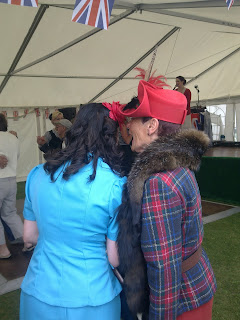
My second historical novel Occupying Love, due out next year,
is set in the German Occupation of the Channel Islands during World War Two. In this excerpt heroine Lydia Page returns to Guernsey on a sunny day in June 1940 unaware that her life is about to change forever.
Chapter One
June 1940
The shock of
that day never left her; it invaded her dreams and shadowed her waking moments.
She could see herself now, carrying an old brown suitcase down the ship’s
gangplank, her chocolate brown hair tousled by the fresh Guernsey breeze. In
the year since she’d left the island nothing had changed. Fishing boats rocked
from side to side, slapping waves against the harbour walls, yacht sails
shimmered in the early evening sun, fine wisps of cloud skittering across the
skies like pockets of hand-stitched lace.
Up ahead, the old tomato lorries wound their
way like a wooden snake towards the cargo ships bound for England. Her papa had
grown tomatoes in the greenhouses behind their home for as long as she could
remember. Nowadays he didn’t need the income, but the twelve-pound fruit
baskets – or ‘chips’ as the locals called them – were his pride and joy. Feeling exhilarated
at the thought of seeing her parents again, Lydia headed for the bus terminus,
stopping to rest on a bench by the harbour wall.
It started as
a low rumble, growing steadily louder till
it turned into a roar. Startled, she shaded her eyes from the sun and stared up
into the sky. Three planes came into view, bright lights shining from their
wings like the eyes of a giant eagle. A wave of raw fear rose up from her stomach.
Someone shouted, ‘Enemy aircraft’ and
her limbs froze. Lydia dropped to the ground, her face hitting the dirt as she
landed. Bullets ricocheted over her head as she cowered in terror while the
bombs plunged with sickening accuracy on to the harbour.
A piercing scream brought Lydia back to
reality – it had come from her own lips. All around her people were crying or
standing motionless in shock as blood dripped on to the pavements while air
raid sirens, woken from their reverie, shrieked in protest. Coughing, she
gasped for air, dense now with smoke, and tried to roll over.
‘You OK,
Miss?’ A policeman loomed overhead.
She fingered a cut on her face. ‘I think so.
What happened?’
‘The Jerries
have bombed the tomato lorries. Must ’ave mistaken them for tanks.’ He gripped
her arm. ‘Can you get up?’
Nodding, she let him pull her off the ground.
‘I’d get out
of here, if I were you. Fast as you can. It’s not safe.’
‘But Papa,
what about Papa?’ A vision of her father lying dead in the rubble flashed in
front of her eyes. ‘He’ll be in one of those lorries…’
‘If he’s out
there now, Miss, there’s nothing you can do for him. You’d best find shelter in
case the Jerries come again.’
Her suitcase long forgotten, Lydia headed for
the dockside where a lone mother sat in the debris, cradling her daughter in
the shelter of the harbour wall. The child was silent but the woman sobbed as
smoke rose into the sky like a giant funeral pyre.
Lydia stumbled on, ignoring the shouts of
well-meaning people; ‘come, shelter with
us, Miss,’ the roar of fire engines and the sickening smell of burnt flesh.
Where was her father…?
A familiar
face appeared through the smoke. ‘Tom –Tommy!’
She’d known his family for years. ‘Have you seen Papa?’ She gestured
towards the smouldering lorries.
‘The Jerries
got their target, alright, but there’s plenty of folk sheltered under the pier.
No-one can get through.’ Tommy Tostevin scratched his head. ‘What on earth are you doing here?’
‘It doesn’t
matter now. I’m here and that’s the end of it. What can I do?’
‘Go home, my
girl. Go to your mother. It’s going to be a long night.’
Lydia nodded,
too numb to cry. She stumbled on down the esplanade towards the Weighbridge,
the familiar granite tower now oozing smoke. Next to it stood a burnt out car
with one headlight clearly visible amongst the wreckage. Staring up at the
clock face, she saw that the hands had stuck at two minutes to seven.
Just then an
ambulance came to a halt, its rear doors opened towards St Julian’s Avenue. With
a burst of adrenalin she headed towards it and jumped inside.
‘You injured,
Miss?’ The white-coated doctor looked up as she landed beside him.
‘No, I’m fine.
It’s just that I know a bit about, well, medicine, and I wondered if I could
help?’
‘There’s lots
of injured people down there. It’s not a pretty sight. We could do with another
pair of hands, though.’ He glanced at her. ‘Are you sure you’re up to it?’
She nodded.
‘Just tell me what you want me to do.’
‘Patch up your
face first.’ He handed her a box of dressings. ‘Then follow me.’
They edged
their way back to the burning lorries, the roar of engines filling the air: the
enemy planes had returned. Lydia ducked and covered her head with the palms of
her hands, her heart pounding louder than the shells that shook the ground
beneath them.
She shut her
eyes but the sight of blood mingling in the gutter with the juice of crushed
tomatoes would stay with her forever.




































